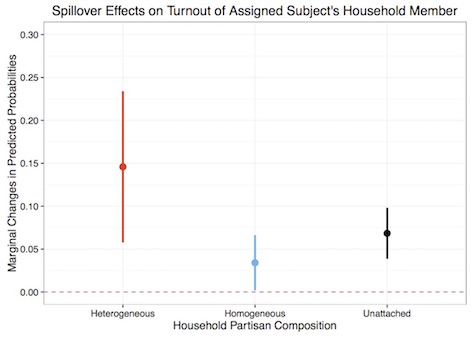Florian Foos, Peter John, Christian Mueller and Kevin Cunningham
Pre-publication version
Data documentation
Reproduction data and code files
Three decades ago Huckfeldt and Sprague hypothesised that partisan context constrains information sharing between neighbours. We develop their theory to identify implications for campaign mobilisation in homogeneous and mixed-partisan contexts. We argue that GOTV spillover effects should vary with the proportion of rival party supporters in a neighbourhood. Based on two samples of households that were either included or excluded pre-random assignment from a street-level GOTV experiment, we test this expectation of differential spillover effects. We estimate neighbourhood party preferences based on targeting data made available by the UK Labour Party. We find that spillover effects on party supporters are smaller in neighbourhoods that include larger shares of rival party supporters. Rival partisans are mobilised in mixed partisan neighbourhoods where the probability of spillovers from mixed partisan households is higher. This paper extends Huckfeldt and Sprague's theory, and demonstrates the importance of social dynamics for parties' campaign strategies.
Does Social Media Promote Civic Activism? A Field Experiment with a Civic Campaign (Political Science Research and Methods, First View)
Florian Foos, Lyubomir Kostadinov, Nikolay Marinov and Frank Schimmelfennig
Pre-publication version
Supporting information
Reproduction data and code files
Social media may help civil society organize and mobilize for different campaigns. However, the extent to which social media campaigns simply recruit like-minded individuals as compared to exerting a causal impact on joiners' attitudes is difficult to disentangle. We test both the organizational and transformative potential of a civil society campaign in a randomized field experiment deployed via Facebook or an email newsletter in collaboration with a Bulgarian environmental campaign. As expected, we find that Bulgarian Facebook users who are active in pro-environmental groups, and those who decide to follow the campaign, are more highly educated than those who decide to stay at the sidelines. Moreover, beliefs in the effectiveness of civic society, character traits, and prior activism systematically predict whether a Bulgarian Facebook user decides to join the cause on Facebook, or subscribe to the email newsletter. In contrast, we find little evidence that the campaign affected opinions, knowledge, or self-reported behavior. We conclude that social media campaigns that are commonplace among civil society organisations are effective at selecting activist-types, but changing the views and behaviors of the broader social media population may be more difficult than assumed.
All in the Family: Partisan Disagreement and Electoral Mobilization in Intimate Networks - a Spillover Experiment (American Journal of Political Science 61(2): 289-304)
Florian Foos and Eline de Rooij
Pre-publication version
Supporting information
Reproduction data and code files
We advance the debate about the impact of political disagreement in social networks on electoral participation by addressing issues of causal inference common in network studies, focusing on voters’ most important context of interpersonal influence: the household. We leverage a randomly assigned spillover experiment conducted in the UK, combined with a detailed database of pre-treatment party preferences and public turnout records, to identify social influence within heterogeneous and homogeneous partisan households. Our results show that intra-household mobilization effects are larger as a result of campaign contact in heterogeneous than in homogeneous partisan households, and larger still when the partisan intensity of the message is exogenously increased, suggesting discussion rather than behavioral contagion as a mechanism. Our results qualify findings from influential observational studies, and suggest that within intimate social networks, negative correlations between political heterogeneity and electoral participation are unlikely to result from political disagreement.

"Voter Mobilization in Intimate Networks" (in Elizabeth Suhay, Bernard Grofman, and Alexander Trechsel (eds.). Oxford Handbook of Electoral Persuasion, Oxford: Oxford University Press)
Florian Foos and Eline de Rooij
Pre-publication version
Political scientists have long observed that interactions within intimate networks such as the household are correlated with higher and concordant turnout behavior. However, it is unclear whether these correlations arise due to social influence, selection, or a shared context, and, if the first, whether it is indeed the intimacy of networks that moderates social influence. This article locates the study of voter mobilization in intimate networks within the context of partisan campaigns and presents examples of studies that apply different strategies to identify social influence between family members, friends, and neighbors. Looking to future advances, the article emphasizes design-based approaches, the collection of detailed covariate data on network characteristics, and collaborations with partner organizations to experimentally test theories of indirect voter mobilization.